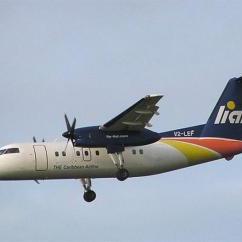
Recent media reports have identified LIAT Airlines as being plagued by what appears to be a series of issues related to management. In today’s environment this scenario seems mostly avoidable and unnecessary.
Management is difficult, managing an airline is even more difficult because of the complexity of the variables, and the inherent domino effect and costs associated with a single failure of any part of the interdependent “machinery”.
Similar to piloting, situational awareness is key in a successful business, and that is why the management dashboard is imperative in knowing where you are with anticipatory cues to manage every changing events.
Let us look at Mr. Brunton’s statement regarding LIAT’s inability to meet it advertised customer obligations, as published in the media. In it he says
“The disruptions being faced by LIAT at this time are caused by a combination of factors. These include, among other things, an increase in unscheduled maintenance at a time when our schedule calls for maximum aircraft availability; crew shortages; bad weather; airport limitations; and delays in obtaining licences for operating our new ATR aircraft in some territories.”
From the list above, only unscheduled maintenance is an event that is difficult to forecast, but that event can be mitigated in several ways using available technology. Most aspects of crew shortage can be managed effectively except for unexpected illness of the crew, and even this can be mitigated by pre planning. The impact of bad weather can be minimized through the use of accurate weather forecasting data, something now easily available, and if weather forecasting information is part of your management dashboard application. The airport limitations (accessibility) scenario should be planned for because most airport maintenance is scheduled. Its inaccessibility complicates management only if the airport becomes unusable in the event of an emergency and that should be accounted for in the operations procedures. Licensing delays are simply a result of poor planning and management strategies.
To become efficient we in the Caribbean must evolve into the new world of technology, coupled with practices, procedures and training that involves smart computer hardware and applications. Every aspect of the organization must be visible and updated (real time) by the appropriate staff and data feeds for the decision makers to not only react, but proactively react.
Procurement of parts, location of equipment and personnel should not be left up to happenstance. The organization's management application must be configured to analyze all scenarios so that the impact of uncontrollable events like equipment failure or sick personnel can be mitigated and the impact substantially reduced.
Modern building elevators use computers to analyze the traffic patterns and pre-position them to transport passengers in the most efficient and time saving way possible. This minimizes customer waiting and maintenance costs, and maximizes customer satisfaction. The aviation industry in the Caribbean must similarly adopt technologies to increase the operational efficiencies and effectiveness. To ignore the technological resources and corresponding management and staff training to utilize the technology, is to condemn our airlines to forever operate in the “putting out fire” mode.
Our culture of operating by individual legacy knowledge (personnel centric) must be revised and the model of management by real time feed-back and artificial intelligence coupled with instantaneous situational awareness (management dashboard) and transparency on decision-making must be adopted. We can, should and must do better.
- Login to post comments


Recent comments
9 years 5 weeks ago
9 years 26 weeks ago
9 years 30 weeks ago
9 years 33 weeks ago
9 years 34 weeks ago
12 years 1 week ago
12 years 15 weeks ago
12 years 35 weeks ago